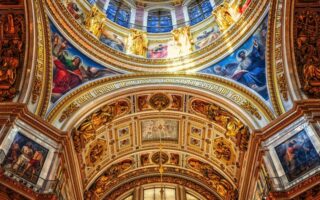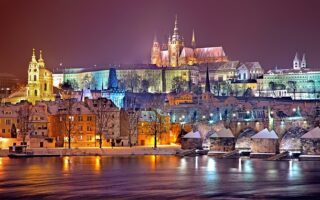Can a Catholic priest say Mass anywhere? This is a question that has been asked by many people, both inside and outside of the Catholic Church. The answer is yes, a Catholic priest can say Mass anywhere, provided that certain conditions are met. In this article, we will discuss the conditions that must be met in order for a priest to say Mass in any location, as well as the importance of the Mass in the Catholic faith. We will also discuss the various types of Masses that can be celebrated and the different roles that a priest can take on during the Mass. Finally, we will look at the importance of the Mass in the life of a Catholic and how it can be a source of spiritual nourishment.
Table of Contents
Exploring the Catholic Church’s Rules on Where a Priest Can Say Mass
Have you ever wondered why some Catholic churches have a priest saying Mass while others don’t? It’s all down to the Catholic Church’s rules on where a priest can say Mass.
The Catholic Church has a long-standing tradition of having a priest say Mass in a church or chapel. This is because the Mass is a sacred ritual that is meant to be celebrated in a special place. The Church believes that the Mass should be celebrated in a place that is set apart from the everyday world and that is dedicated to the worship of God.
The Church also has rules about who can say Mass. Generally, only priests who have been ordained by the Church can say Mass. This means that lay people, such as deacons or lay ministers, cannot say Mass.
The Church also has rules about where a priest can say Mass. Generally, a priest can only say Mass in a church or chapel that has been approved by the Church. This means that a priest cannot say Mass in a private home or in a public place, such as a park or a beach.
The Church also has rules about how often a priest can say Mass. Generally, a priest can only say Mass once a day. This means that if a priest is saying Mass in one church, he cannot then go to another church and say Mass there.
Finally, the Church has rules about who can attend Mass. Generally, only members of the Catholic Church can attend Mass. This means that non-Catholics cannot attend Mass.
These are the Catholic Church’s rules on where a priest can say Mass. While these rules may seem strict, they are in place to ensure that the Mass is celebrated in a sacred and special place.
Examining the History of Where Priests Have Been Allowed to Say Mass
Have you ever wondered where priests have been allowed to say Mass throughout history? It’s an interesting topic to explore, and one that has changed over time.
In the early days of Christianity, Mass was celebrated in homes and other private places. This was due to the fact that Christianity was not yet an accepted religion, so public places of worship were not available. As Christianity spread, churches were built and Mass was celebrated in them.
In the Middle Ages, Mass was celebrated in churches, but it was also celebrated in monasteries and other religious institutions. This was due to the fact that the Church was the main source of power and authority in Europe at the time.
In the Reformation period, Mass was celebrated in churches, but it was also celebrated in private homes. This was due to the fact that the Protestant Reformation had made it possible for people to practice their faith in their own homes.
In the modern era, Mass is celebrated in churches, but it is also celebrated in other places, such as schools, hospitals, and even prisons. This is due to the fact that the Catholic Church has become more open to celebrating Mass in different places.
So, as you can see, the places where priests have been allowed to say Mass have changed over time. It’s an interesting topic to explore, and one that has evolved with the changing times.
Investigating the Different Types of Masses a Priest Can Say Anywhere
If you’ve ever been to a Catholic church, you’ve probably seen a priest say Mass. But did you know that there are actually different types of Masses a priest can say? Let’s take a look at the different types of Masses a priest can say anywhere.
The first type of Mass is the Ordinary Form of the Mass. This is the most common type of Mass and is celebrated in most Catholic churches. It includes the readings, homily, and prayers that are part of the Mass.
The second type of Mass is the Extraordinary Form of the Mass. This type of Mass is celebrated in some Catholic churches and is based on the traditional Latin Mass. It includes the same readings, homily, and prayers as the Ordinary Form of the Mass, but is said in Latin.
The third type of Mass is the Tridentine Mass. This type of Mass is based on the traditional Latin Mass and is celebrated in some Catholic churches. It includes the same readings, homily, and prayers as the Ordinary Form of the Mass, but is said in Latin and includes additional prayers and rituals.
The fourth type of Mass is the Novus Ordo Mass. This type of Mass is based on the traditional Latin Mass and is celebrated in some Catholic churches. It includes the same readings, homily, and prayers as the Ordinary Form of the Mass, but is said in Latin and includes additional prayers and rituals.
Finally, the fifth type of Mass is the Mass of the Angels. This type of Mass is celebrated in some Catholic churches and is based on the traditional Latin Mass. It includes the same readings, homily, and prayers as the Ordinary Form of the Mass, but is said in Latin and includes additional prayers and rituals.
So there you have it! These are the five different types of Masses a priest can say anywhere. Whether you’re attending a Mass in a Catholic church or just want to learn more about the different types of Masses, now you know what to look for.
Understanding the Significance of Where a Priest Can Say Mass in the Catholic Church
If you’re a Catholic, you may have noticed that priests can say Mass in a variety of places. But why is this? What’s the significance of where a priest can say Mass?
Well, the Catholic Church has a long history of celebrating Mass in different places. In the early days of the Church, Mass was celebrated in homes and other private places. As the Church grew, Mass was celebrated in public places like churches and cathedrals.
Today, the Catholic Church still allows priests to say Mass in a variety of places. This is because the Church recognizes that Mass is a special event that should be celebrated in a special place. Mass is a time for the faithful to come together to worship God and to celebrate the Eucharist.
The Church also recognizes that Mass can be celebrated in places that are meaningful to the faithful. For example, a priest may say Mass in a hospital chapel to bring comfort to those who are ill. Or a priest may say Mass in a prison to bring hope to those who are incarcerated.
The Church also recognizes that Mass can be celebrated in places that are special to the priest. For example, a priest may say Mass in his home parish to celebrate his ministry. Or a priest may say Mass in a place that has special significance to him, such as a place where he was ordained or a place where he served as a missionary.
No matter where a priest says Mass, it is a special event that should be celebrated with reverence and respect. The Church recognizes the importance of Mass and encourages priests to celebrate it in places that are meaningful to them and to the faithful.
Conclusion
In conclusion, a Catholic priest can say Mass anywhere, provided that the place is suitable and the priest has the necessary permission from the local bishop. The Mass is a sacred ritual that is meant to be celebrated in a place that is conducive to prayer and reflection. It is important to remember that the Mass is a special and holy event, and it should be treated with the utmost respect and reverence.
For licensing reasons, we must provide the following notice: This content was created in part with the help of an AI.


